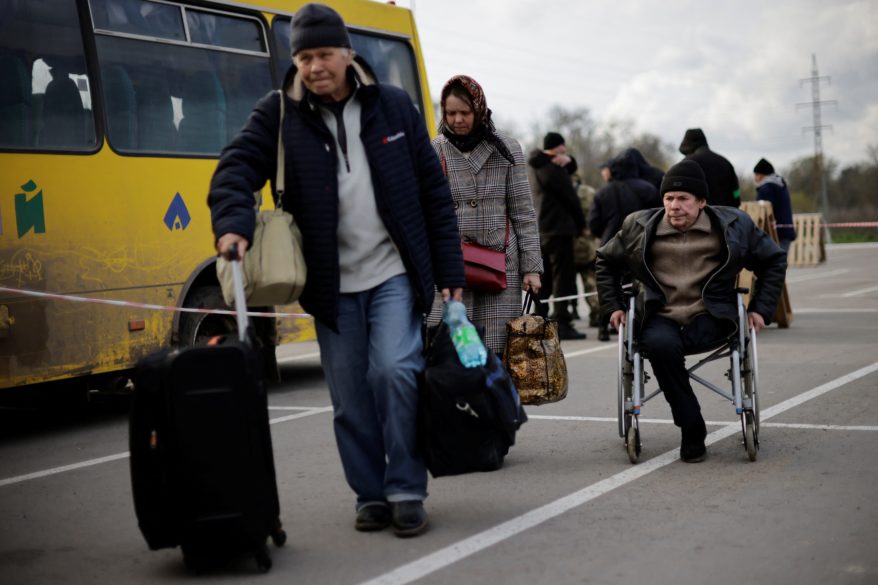
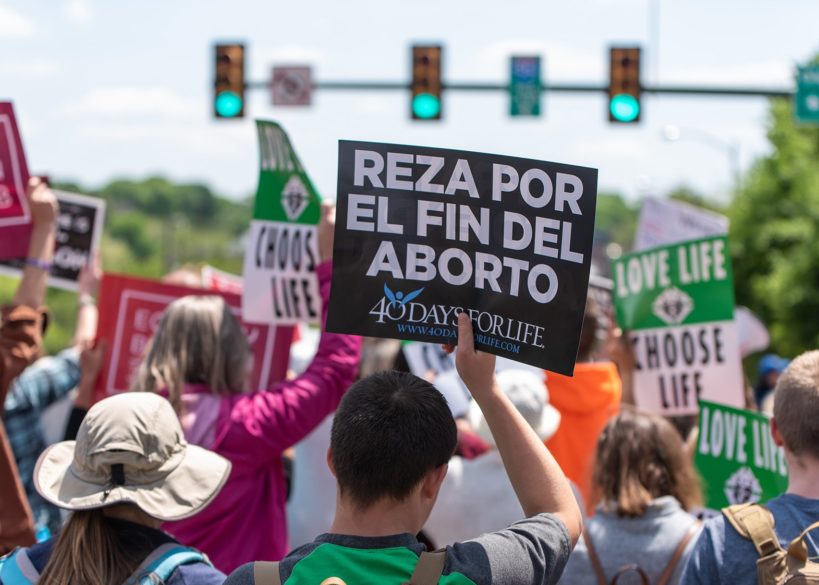
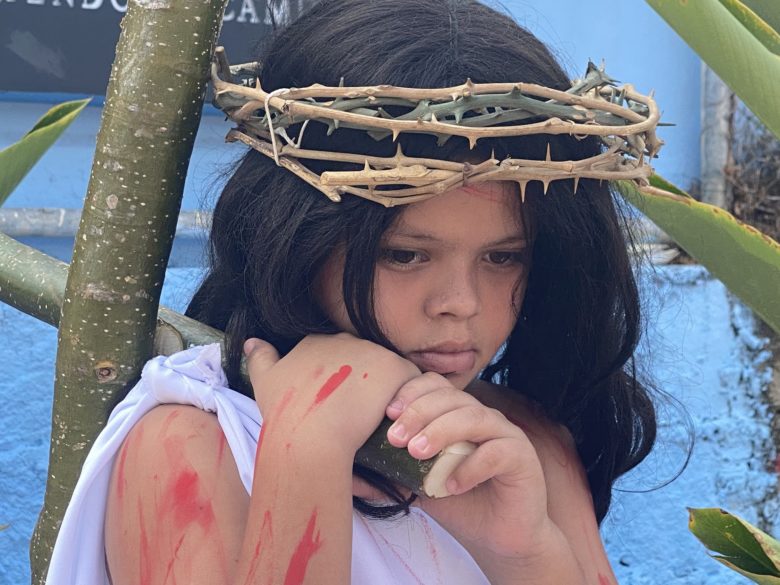
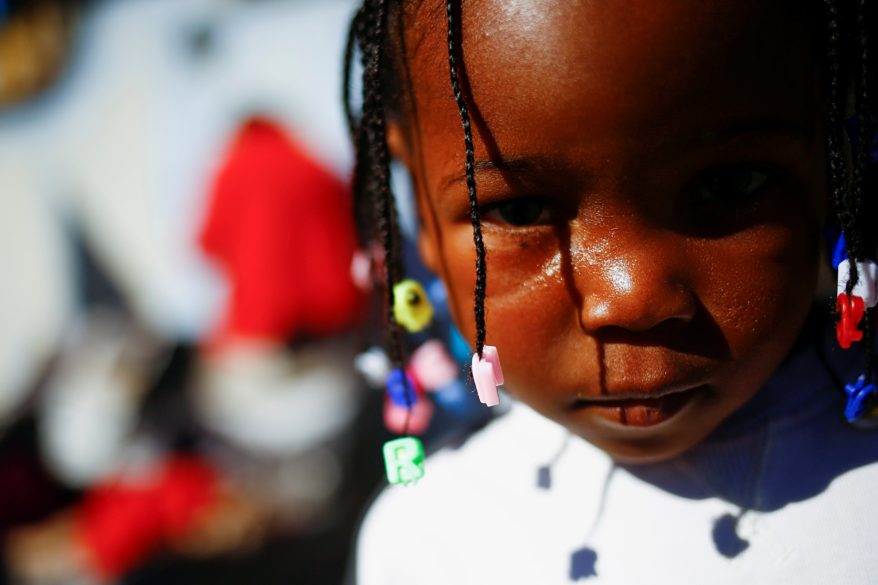
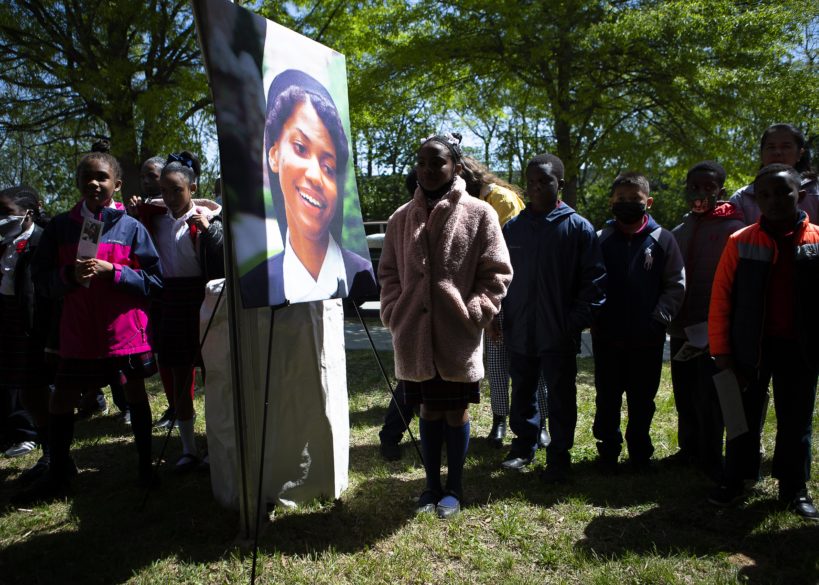
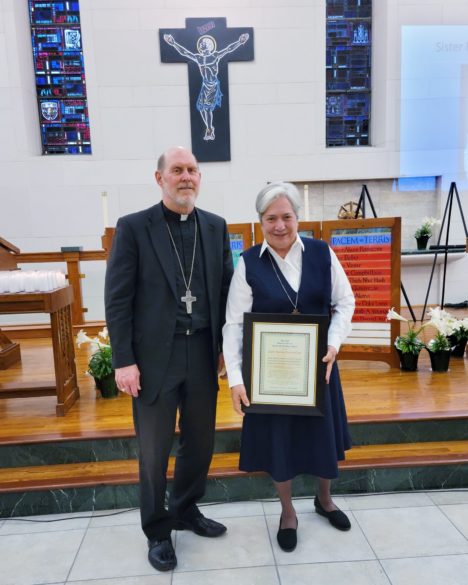








Por Rhina Guidos
Catholic News Service
SAN SALVADOR, El Salvador (CNS) — La imagen de Jesús, esposado y con ojos vendados en las procesiones de Semana Santa aquí, entró muy cerca en el corazón de Gabriela Rivas. Como muchas mujeres en El Salvador, Rivas pasó la Semana Santa buscando ayuda para su esposo, detenido sin causa, dijo, por autoridades el 10 de abril, Domingo de Ramos.
“No sabemos en qué condición está, no tenemos acceso a nada, no hay comunicación, no hay visitas”, y no hay forma de sacarlo de la carcel, dijo Rivas, una madre católica de dos hijos, en una entrevista el 15 de abril con Catholic News Service.
El esposo de Rivas es uno de los más de 12,000 salvadoreños que el gobierno ha detenido desde el 27 de marzo, el día en que legisladores aprobaron una ley de emergencia que facilitó las detenciones en el país centroamericano, una medida necesaria, dijeron las autoridades, para combatir la violencia de las pandillas tras un fin de semana que cobró un número récord de homicidios a finales de marzo.
“Más de 12,000 terroristas capturados en solo 21 días”, tuiteó el presidente salvadoreño Nayib Bukele el 15 de abril.
Pero Rivas dijo que su esposo no era terrorista ni pandillero. Era un motorista que intentaba ganarse el pan de cada día para sostener a su familia cuando el gobierno lo detuvo injustamente usando la ley de emergencia.
La medida suspende por 30 días libertades constitucionales, como el derecho de reunión, debido proceso, privacidad en las comunicaciones, y amenaza con detener a presuntos “colaboradores” de pandillas.
Muchos en el país centroamericano de alrededor de 6 millones han aplaudido las detenciones, algunas que han salido en la cuenta de Twitter del presidente con fotos de algunos de los detenidos con tatuajes afiliados a pandillas. Pero recientemente, Marvin Reyes, representante del Sindicato de Trabajadores de la Policía de El Salvador, dijo a las agencias de noticias en una conferencia de prensa que los policías han sido presionados para dar “falsas declaraciones” para cumplir con una cuota de detenciones.
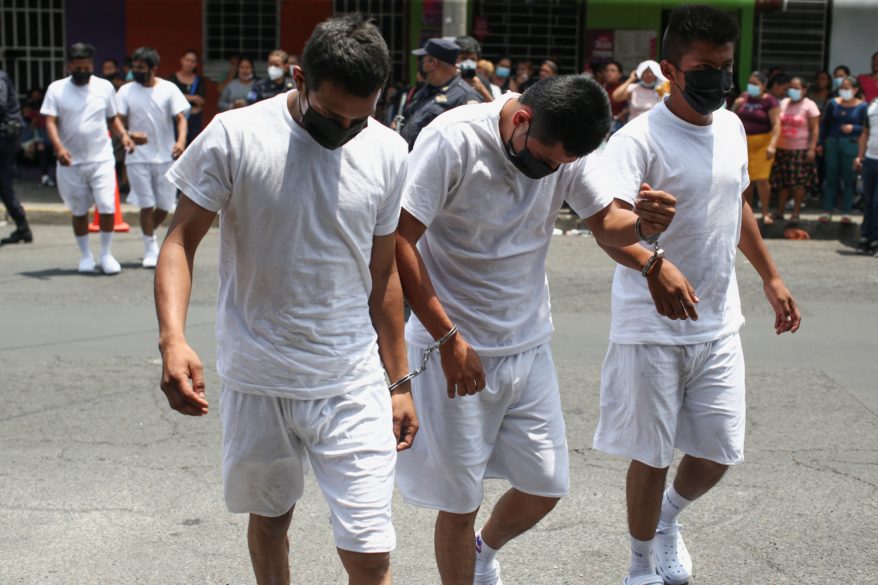
Rivas cree que eso fue lo que le sucedió a su esposo, quien no tiene antecedentes penales ni afiliación con pandillas. Era solo un número para complacer una cuota, cree ella.
“Un oficial me dijo a mí de que era por las amistades que él tenía”, dijo, y piensa que se inventó la acusación, señalando a su esposo como un colaborador de pandillas sin tener pruebas.
Bukele reconoció a través de Twitter la probabilidad del “1%” de que algunas personas inocentes puedan ser detenidas bajo las detenciones masivas, sin embargo, organismos que velan por los derechos humanos en el país consideran que el porcentaje es más alto.
Entre las detenciones cuestionables más notables existe un incidente del 9 de abril que involucró a cuatro baristas capturados cuando se dirigían a su casa después de un turno. Las autoridades los fotografiaron esposados, con el uniforme de una cafetería popular donde trabajaban, subieron sus fotos a Twitter, identificaron a los jóvenes como pandilleros diciendo que el dinero de las propinas provenía de actividades ilegales. Sin embargo, tras protestas públicas, fueron liberados.
El periódico El Diario de Hoy también informó el 11 de abril del caso de un salvadoreño que estaba de visita en El Salvador desde EE.UU. con su sobrino, un menor de edad de Virginia. Ambos fueron detenidos cuando la policía allanó un evento donde se recaudaba fondos para una persona que padecía de una deficiencia renal. Amigos y conocidos recurrieron a Twitter para crear conciencia sobre su detención, pero no se sabe si han sido liberados.
Algunos dicen que los agentes de policía han estado yendo de puerta en puerta en algunos de los barrios más pobres del país preguntando cuales residentes tienen tatuajes, ya que los pandilleros los usan para identificarse con un grupo criminal en particular.
Como muchos salvadoreños, Rivas dijo que está harta de las pandillas y de la miseria que han desatado en gran medida sobre los pobres de El Salvador, pero pisotear los derechos básicos de los inocentes para acabar con ellos no está bien, dijo.
“Estamos de acuerdo que el gobierno combata hacia las pandillas pero también estamos de acuerdo que deberían hacer una investigación y que ellos tuvieran una denuncia, decirle ‘miren lo vamos detener por esto’ (antes de llevárselos)…tener su denuncia pero no, aquí no ha habido (debido) proceso”, dijo Rivas.
En una conferencia de prensa el 17 de abril, el arzobispo José Luis Escobar Alas de la Arquidiócesis de San Salvador, comparó las detenciones a una “medicina de mal gusto” diciendo que se habían considerado necesarias para detener el nivel de violencia y dijo que había hablado con “muchas personas” que vieron “esperanza” en lo que estaba pasando.
“He podido platicar con las personas del pueblo, personas que les toca que tomar el bus diariamente o que tienen sus pequeños negocios, etcétera, y la verdad, todas estas personas me han expresado estar de acuerdo, estar contentas, estar agradecidas porque sienten un alivio en su situación. Ahora ya pueden caminar con seguridad”, dijo el arzobispo. “Eso también hay que decirlo y, bueno, hay que decir que la violencia en este país, que este es el verdadero problema”.
La conferencia episcopal de obispos católicos salvadoreños no ha dicho nada al respecto, aunque algunos obispos oraron públicamente por las familias cuyos seres queridos han sido detenidos sin pruebas, y otros, como el cardenal Gregorio Rosa Chávez del país, instaron al gobierno a buscar el diálogo con otros actores en sociedad civil salvadoreña.
Algunos argumentan que las medidas de emergencia se han utilizado para restringir el derecho de la prensa, ya que el presidente y el partido Nuevas Ideas que fundó han atacado a periodistas.
En una declaración del 5 de abril, el secretario de Estado de EE. UU., Antony Blinken, advirtió al gobierno contra algunas de las violaciones de derechos que han sufrido durante la persecución de elementos criminales.
“Las pandillas representan una amenaza para la seguridad nacional de El Salvador y Estados Unidos”, dijo. “Instamos a El Salvador a abordar esta amenaza y al mismo tiempo proteger las libertades civiles vitales, incluida la libertad de prensa, el debido proceso y la libertad de expresión”.
También instó al gobierno salvadoreño a permitir la extradición de ciertos líderes de pandillas en el país “para enfrentar la justicia en los Estados Unidos”, algo que ha sido negado.
El arzobispo Escobar Alas dijo que espera que abogados puedan enderezar cualquier caso que haya involucrado la detención de personas inocentes e instó al gobierno a brindar información a las familias sobre el paradero de sus seres queridos.
Para aquellos como Rivas, sin embargo, el daño ya está hecho. Ha contratado a un abogado, lo que le ha restado dinero a una situación económica ya de por sí precaria para la familia. El abogado le dijo que buscara declaraciones de vecinos, amigos, cualquier persona para que una vez que a su esposo se le permita tener un día en los tribunales, tal vez el apoyo de la comunidad pueda liberarlo, al igual que se liberaron a los baristas. Sus hijos han estado llorando, sus suegros también y ella está preocupada por los estragos económicos que la situación ha desatado en su familia.
“De él dependen dos hijos, él tiene un préstamo en el banco que él tiene que iniciar a pagar”, y aunque ella contribuye al ingreso mensual de la familia, él es quien paga la mayoría de las cuentas mensuales, dijo.
“Él nunca estuvo involucrado en problemas, ni siquiera cuando era joven, y mucho menos ahora que es un adulto con hijos que mantener”, dijo. “Nunca tuvo problemas, ni en su juventud, ni ahora que él ya es adulto. Entonces nos afecta de una manera, o sea, lamentable, pues, porque no esperábamos esto”.
Por David Agren
CHILPANCINGO, México (CNS) — Los jefes del crimen organizado local fueron los primeros en dar la bienvenida al obispo Salvador Rangel Mendoza cuando llegó a la Diócesis de Chilpancingo-Chilapa, a menudo violenta, para su toma de posesión en 2015. Ellos insistieron en partir inmediatamente el pan con el obispo.
“Fue algo accidental”, expresó el obispo Rangel sobre su llegada. “Me dijeron que no tuviera preocupación alguna, que ellos me iban a cuidar como amigos”, recordó. “Lo curioso fue que en vez de haberme ido a recibir el clero (los sacerdotes), me recibieron ellos”.
Dicha comida de bienvenida fue la primera de muchas reuniones con los jefes del crimen organizado en la diócesis, que, situado en el estado de Guerrero, es el centro de producción de heroína de México que ha estado plagado de conflictos con cárteles de droga.
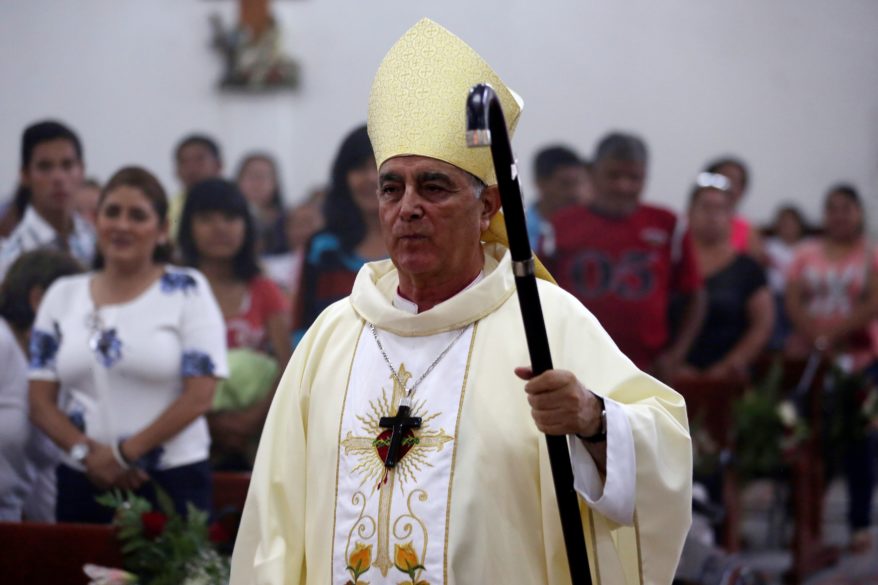
El encuentro marcó el tono de como iba a ser su paso por Chilpancingo, ofreciéndole un adelanto de como él optaría por buscar el diálogo con todos los bandos. Este es un enfoque pastoral que trajo de su puesto anterior como obispo en el estado central de Hidalgo, donde los jefes del crimen organizado que conoció enviaron un par de vehículos para escoltarlo a Guerrero mientras conducía a su toma de posesión. Fueron estos mismos jefes quienes llamaron con anticipación a sus colegas del crimen para que le prepararan una bienvenida.
Sin embargo, esta situación también ha traído controversias y acusaciones. El gobierno del estado de Guerrero lo acusó de aceptar obsequios inapropiados de delincuentes — algo que el obispo niega — y los defensores de derechos humanos expresaron su consternación porque cultiva relaciones con victimarios en lugar de con víctimas de la violencia. Los analistas de seguridad también dicen que el obispo parece haberse acercado más a una organización criminal conocida como Los Ardillos.
A principios de este año, el obispo Rangel presentó su renuncia tras haber cumplido los 75 años, la edad establecida por el derecho canónico para que un obispo presente su renuncia al Santo Padre. Su sucesor, el obispo José de Jesús González Hernández, fue instalado el 19 de abril.
El obispo Rangel niega las acusaciones de cualquier relación adversa o favoritismos. Pero insistió de Los Ardillos: “En su zona no hay secuestros, ni extorsiones, ni asesinatos”.
Un analista de seguridad contactado por Catholic News Service señaló que tales afirmaciones de que los cárteles de droga pacifican las regiones que dominan y son moralmente mejores que sus rivales son comunes y, a menudo, imposibles de verificar.
“Todos los grupos con los que he hablado afirman que no extorsionan, no secuestran, ni matan a personas inocentes”, manifestó Falko Ernst, analista principal de México en International Crisis Group. “Estas afirmaciones, según mi experiencia, nunca están libres de contradicciones”.
Ante las críticas, monseñor Rangel dijo: “Siempre he dicho que los narcotraficantes son personas, tienen sentimientos, y tienen razones del porque actúan”. El obispo agregó que sus acciones se derivan de su vocación franciscana, que implica “acercarse a los enemigos”.
“Hemos trabajado en favor de la paz, eso que me han criticado mucho, del acercamiento a los narcotraficantes, pero ha sido la manera, la manera de lograr la paz en estas tierras”, acotó.
En su tiempo como jefe de la diócesis, el obispo Rangel a menudo aparecía en los titulares de los medios nacionales. Era conocido por hablar con una franqueza poco común entre los obispos católicos, quienes por lo general prefieren no opinar sobre asuntos políticos y de seguridad locales.
Él había criticado a la clase política local y las percepciones de su colusión con los cárteles de droga, diciendo después de las elecciones de Guerrero de 2021: “Ahora el que nos va a gobernar es el narco, no los políticos”.
El obispo Rangel también expresó su decepción con el presidente Andrés Manuel López Obrador, quien llegó a su diócesis como candidato a fines de 2017 y prometió una amnistía para quienes están en el negocio de las drogas ilegales.
El obispo apoyó la idea de la amnistía, pero nunca se implementó. Mientras tanto, López Obrador ha impulsado una política de seguridad de “abrazos, no balazos”, lo que ha resultado en menos enfrentamientos entre fuerzas de seguridad y grupos criminales, pero no ha calmado al país, indicó el obispo Rangel.
“El narco está aprovechando esta benevolencia, bondad del gobierno, o cierta debilidad del gobierno”, acotó.
El obispo Rangel llegó en un momento difícil al estado de Guerrero, cuando por un lado había una profunda pobreza en pueblos indígenas aislados y por el otro se encontraba la glamorosa ciudad de Acapulco. Su instalación se produjo poco después del ataque de septiembre de 2014 contra 43 futuros maestros, cuya escuela está en su diócesis — una tragedia en la que nadie sabe qué ocurrió realmente.
Los cárteles de droga también habían comenzado a fragmentarse en Guerrero a medida que los grupos criminales luchaban por la producción y comercialización de amapolas de opio, lo que ayudó a alimentar la crisis de opioides en Estados Unidos.
Sin embargo, los precios de la amapola se desplomaron en un 90 por ciento durante el tiempo del obispo Rangel en Guerrero cuando los cárteles de droga empezaron a producir “china blanca”, que contenía fentanilo, dijo. La situación se tornó tan desesperada para los agricultores pobres — que durante mucho tiempo habían cultivado amapolas de opio para llegar a fin de mes — que la diócesis empezó a organizar colectas de alimentos para la empobrecida zona montañosa.
Hoy en día, dice el obispo Rangel, los cárteles de droga ganan dinero a través de la extorsión y el secuestro y se han apropiado de las arcas de los gobiernos municipales.
A menudo el obispo Rangel ha intervenido en esas disputas, incluyendo algunas que involucran a la Iglesia Católica. Su primera reunión después de ser recibido por los jefes del crimen organizado fue para preguntar sobre las amenazas contra un sacerdote. Más tarde pidió a los jefes del crimen que extorsionaban a la catedral en la diócesis vecina de Tlapa que dejen de hacerlo.
Sin embargo, la relación entre los miembros del cartel de droga y la Iglesia Católica es complicada, especialmente porque los primeros pueden parecer piadosos. Un par de sacerdotes diocesanos fueron asesinados cuando regresaban de un festival de la ciudad en febrero de 2018, un crimen que sigue sin resolverse, pero que se cree que está relacionado con un cártel.
El padre comboniano John Ssenyondo fue asesinado en 2014 y sus restos arrojados a una fosa común. El obispo Rangel dice que el misionero comboniano de Uganda se negó a realizar un bautismo porque consideraba que el padrino, que era un líder de la aldea local, no era apto para el rol.
El obispo Rangel implementó una nueva política de no hacer preguntas sobre bautismos.
“El testigo puede ser de cualquier religión, cualquier ideología” para evitar problemas, dijo, y agregó: “por supuesto que no son los mejores testigos, pero tiene que haber un testigo”.
Él recordó un bautizo especialmente turbulento en el que un capo del crimen con “25 hijos e involucrado con cuatro mujeres, todas ahí”, llevó a un niño a recibir el sacramento.
“¿(En ese caso) qué hago yo?” preguntó. “No veo, no oigo . . .”.
NATION
FLAT ROCK, Mich. (CNS) – In the year 1300, a priest was celebrating Mass in the convent of O Cebreiro, Spain. Lacking faith in the true presence of Jesus in the sacrament, the priest nevertheless recited the consecration prayers. Suddenly, the host he held in his hand turned into human flesh. Turning to the cup, the priest, incredulous, noticed not wine, but actual human blood. He fell in adoration. The incident, recognized by Pope Innocent VIII as the “Miracle of O Cebreiro,” is one of hundreds of eucharistic miracles in the Catholic Church’s history – incidents in which the supernatural reality of Jesus’ body and blood in the Eucharist became powerfully and physically apparent. The church teaches that the Eucharist is the “source and summit” of the Catholic faith, although a 2019 Pew study found that only one-third of Catholics believe in the Real Presence in the Eucharist. The Real Presence Apostolate of Michigan has been educating Catholics on the Real Presence since 2007 by offering a traveling exhibit about eucharistic miracles – instances in which the literal presence of Jesus’ body and blood in the Eucharist have become physically manifest. The exhibit has 170 panels and all were on display in the vestibule of St. Roch Parish in Flat Rock at the start of Holy Week. Several parishes in the Archdiocese of Detroit hosted the exhibit recently, and its next stop was Grand Rapids, Michigan, April 22-29.
NEW YORK (CNS) – Ukrainian Catholics in New York celebrated Easter with prayers that Christ’s triumph over death will also signify victory over everything evil happening in their home country. Bishop Paul P. Chomnycky of the Ukrainian Catholic Eparchy of Stamford, Connecticut, was the main celebrant for the Easter Divine Liturgies April 24 at St. George Ukrainian Catholic Church in the East Village neighborhood of Manhattan. The parish celebrates services according to the Julian calendar. On the 60th day of the Russian invasion of Ukraine, Bishop Chomnycky said the situation there is coloring the whole Easter feast, as a cloud hanging over everything, but there is reason for hope. “In the resurrection, not only did Christ defeat death, but he also defeated violence, evil and mistruth,” he said. He said all Ukrainians are “putting our trust in the resurrected Christ that he will defeat evil in our country.” He also read passages from the Easter message of Archbishop Sviatoslav Shevchuk, major archbishop of the Ukrainian Catholic Church. Writing from Kyiv, Archbishop Shevchuk compared the passion of Christ to the war in Ukraine. “We have become aware of how human nature remains fallen, how the devil continues to control human beings who have no God in their hearts. He who sows hatred and instigates war against one’s neighbor opposes the almighty.”
VATICAN
VATICAN CITY (CNS) – In war, especially the current conflict in Ukraine, no one can claim victory, because all of humanity loses, Pope Francis said. During an April 23 meeting with a group of Italian pilgrims commemorating a miraculous image of Mary that wept, the pope said her tears are a sign of God’s compassion as well as his sorrow for humankind’s sins. Mary’s tears are “a sign of God’s weeping for the victims of the war that is destroying not only Ukraine – let’s be brave and tell the truth – it is destroying all the countries involved in the war. All of them.” War, he explained, “not only destroys the people who have been defeated. No, it also destroys the victor. It also destroys those who look at it as superficial news to see who is the winner, who is the loser. War destroys everyone.” More than 3,000 pilgrims took part in the pilgrimage, which coincided with the 500th anniversary of a miracle in which an image depicting Mary at Jesus’ side during the crucifixion shed tears of blood. The tears that Mary shed, as well as the miracles attributed to the image over the centuries, are not only a sign of God’s love for his children but also “Christ’s pain for our sins, for the evil that afflicts humanity.”
WORLD
KINSHASA, Congo (CNS) – A Catholic priest in Congo said Pope Francis will be visiting the country not only to reconcile it, but also to tell the world “about the conflicts that are tearing this country apart.” The announcement of the pope’s July 2-5 visit “sounded like the voice of the angel of the Lord to the poor shepherds in the region of Bethlehem: ‘I bring you good news of great joy, which will be for all the people,’” said Father Georges Kalenga, a member of the planning committee who is also second deputy secretary-general of the Congolese bishops’ conference. Father Kalenga told Catholic News Service that the pope will be visiting to reconcile a people blighted by the evils of “tribalism, regionalism and clientelism, the exclusion of political opponents, practices and discourses that weaken social ties, compromise national cohesion on several levels, particularly on the socio-political level.” Pope Francis will visit Kinshasa, the country’s capital, but he also will travel to Goma, in the east. Father Kalenga said Goma is “the place chosen symbolically for the pope’s meeting with the people who live in the eastern part of the country, bloodied for more than two decades by wars, rapes, massacres and all the other violations of human dignity.”
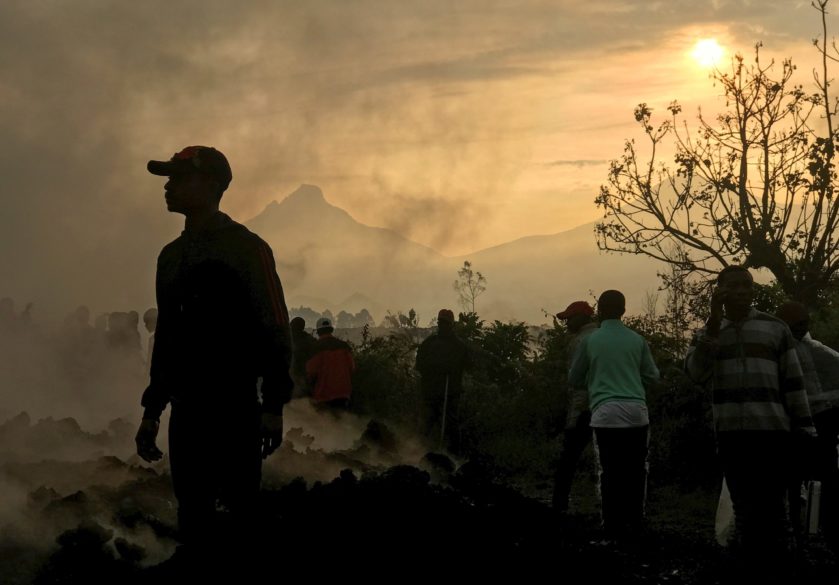
By Catholic News Service
LVIV, Ukraine – For Msgr. Kieran Harrington, national director of the Pontifical Mission Societies in the United States, the timing of his visit to Ukraine – Holy Week according to the Julian calendar – was intentional.
“I thought that it is important at this moment of war to come to a place we support to be with those who are in the midst of suffering, to be with Christ where he is suffering now, to stand at the foot of the cross here in Ukraine,” he said.
“You cannot stop the suffering, but you can be with them, so that they know they are not suffering by themselves, so they know that they are not alone,” he said. “It matters that someone comes and cares about your suffering.”
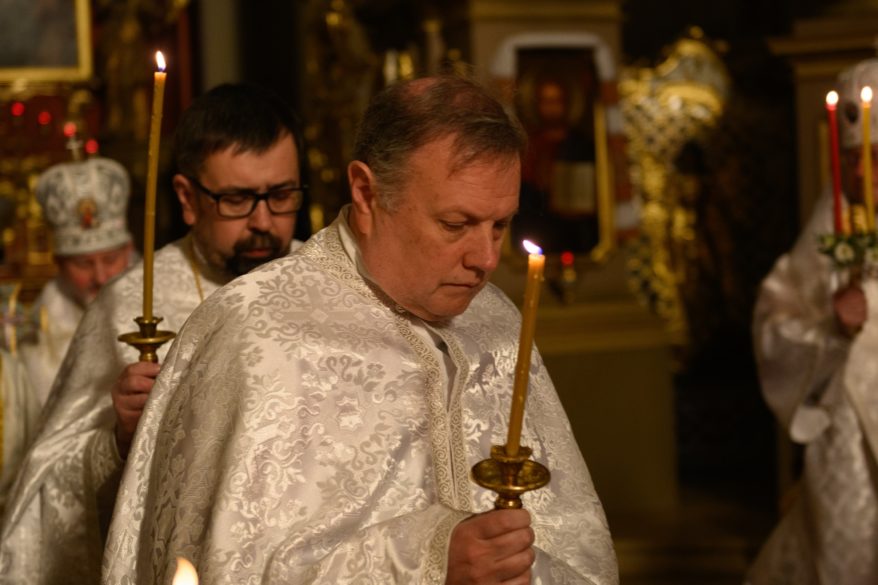
Msgr. Harrington admitted a bit of fear traveling to Ukraine. “And then I meet mothers concerned about their children, who’ve heard the pounding of bombs and the scaring effect of that. I speak to a young girl who had gone through that experience and is looking at her sister and not wanting her sister to experience that.
“And others feel hatred for what is being done and are so upset that they are hating, because they know we are made for love. This is the takeaway for me. That God made us to love. And war makes us hate.”
Bringing humanitarian aid and other assistance for the outreach by the church in Ukraine and in Poland, Msgr. Harrington noted that “spiritual accompaniment” was critical as well: “to be here in Holy Week, to pray with the people, to journey with them through our Lord’s passion and crucifixion, to remind them of the hope of the resurrection.”
The Pontifical Mission Societies are intended to help the church grow, including with programs for children.
“But now we are in war,” Msgr. Harrington said, “and many of those who have supported our work want to help with the immediate need. And so that is why I am here, to bring that immediate help for food, for medicine. Our brothers and sisters are suffering, so we give what we can.”
Traveling with Msgr. Harrington throughout Ukraine were Father Sebastian Sardo, an Argentine priest who is ecclesiastical assistant at the U.S. office of the Pontifical Mission Societies, and Father Israel Perez, a priest of the Brooklyn Diocese, who is originally from Cuba.
St. Joseph Monastery of the Basilian Fathers near Lviv opened its doors to 170 refugees. This is where the U.S. group started its journey in Ukraine April 20.
Basilian Father Panteleimon Trofimov, the monastery’s superior, told Msgr. Harrington he had no hesitation in welcoming the refugees, mostly mothers and children.
“We are Christians. How could we not welcome them into our home? Our place is to be with people,” he said.
One refugee, Halina, made a 12-hour journey from Kyiv to the Lviv monastery. She said she asks God to keep as many people alive as possible. When asked about where God is in all this, a widow, Taisia, 85, also staying at the monastery, said: “God is here! Here’s an example for you: How else did we get here?”
Many Eastern-rite Catholics, as well as Orthodox, celebrate Easter according to the Julian calendar, often a week after Latin-rite Catholics celebrate Easter.
On Holy Thursday, April 21, Msgr. Harrington visited Ternopil. In addition to the celebration of the Lord’s Supper, he met with Ukrainian Catholic Auxiliary Bishop Teodor Martynyuk and discussed church efforts to assist refugees from eastern Ukraine.
The U.S. delegation traveled to Kyiv on Good Friday, April 22, and visited an area with cars destroyed by bullets and bombs – cars where children and families were killed. The priests also prayed at a mass grave.
“Horrifying,” Msgr. Harrington said. “You see the physical destruction, but in speaking to the people, you also learn the emotional destruction.
“God is suffering with us in these moments, but it’s not the last word; we know that from Good Friday,” he said. “It may be ferocious, but at the end of the day, evil is conquered by grace.”
Returning to Lviv for Easter April 24, Msgr. Harrington reflected on his journey in light of Holy Week.
“It’s the grace of Christ’s death and resurrection that give us life,” he said, “and we believe that there will be an Easter moment.”
He encouraged prayer – “we help by our prayers” – and support – “that is what charity is, it is love, giving of ourselves.”
“This was a privileged time,” Msgr. Harrington said, “a blessing to walk with them in their suffering, to walk with them in solidarity.”
By the end of the week, $200,000 had been sent by the Pontifical Mission Societies to support the efforts of the Catholic Church in Ukraine and Poland to assist refugees and those in immediate need.
Editors: Support can be offered for all these efforts through the Pontifical Mission Societies at MISSIO.org/HelpUkraine.
NATION
WASHINGTON (CNS) – Two members of a group called Progressive Anti-Abortion Uprising said April 5 that five fetuses taken by the police a week earlier from the Capitol Hill residence of one of the activists were “proof of illegal abortions” being performed at a Washington abortion clinic. Activists Lauren Handy, 28, and Terrisa Bukovinac, 41, made the comments at a news conference. The same day, a group of 23 congressional Republicans wrote a letter to Mayor Muriel Bowser and Police Chief Robert J. Contee III asking for a thorough investigation of the remains “of five preborn children” and urging they not assume – “without conducting any medical evaluations” – that “each child died as the result of a legal abortion.” Handy and Bukovinac said the fetuses are from a box of medical waste they got from the driver of a medical waste truck at an abortion clinic, and they claimed the fetuses looked like they were from late-stage abortions. According to a Washington Post story and other news accounts, the two women described walking up to a Curtis Bay Medical Waste Services truck outside the Washington Surgi-Clinic, one of a few U.S. abortion clinics that does late-term abortions. They said they asked the driver if he had picked up anything from the clinic. The driver told them yes, they said, so they asked for a box. “The driver asked what they would do with the remains inside,” The Washington Post reported. “After they told him they would give the (fetal) remains a funeral and bury them … the driver gave them a box.”
NEW ORLEANS (CNS) – The attack in which Marianite Sister Suellen Tennyson, 83, was abducted from her convent in Yalgo, Burkina Faso, the morning of April 5 was conducted by at least 10 armed men, the Marianites of Holy Cross said in an electronic newsletter. The congregation said Sister Tennyson, the former international congregational leader for order and a native of the Archdiocese of New Orleans, was sleeping when the men burst into the convent, ransacked the living quarters and kidnapped her, leaving behind two other Marianite sisters and two young women who also live in the convent. “There were about 10 men who came during the night while the sisters were sleeping,” Marianite Sister Ann Lacour, congregational leader, said in the e-bulletin April 6. “They destroyed almost everything in the house, shot holes in the new truck and tried to burn it. The house itself is OK, but its contents are ruined.” Sister Lacour, who currently is attending a congregational meeting in Le Mans, France, said the Marianites have contacted both the U.S. Embassy in Burkina Faso and the U.S. State Department, and “they have assured us that this is a high priority case for them.” The congregation also has contacted the apostolic nuncios to the U.S., Burkina Faso and France as well as the Vatican’s secretary of state and the Leadership Conference of Women Religious in the U.S. The other two Marianites at the convent – Sister Pauline Drouin, a Canadian, and Sister Pascaline Tougma, a Burkinabé – were not abducted and did not see many of the details. “They think there were more men on the road. They have heard nothing from or about Suellen since she was taken.”
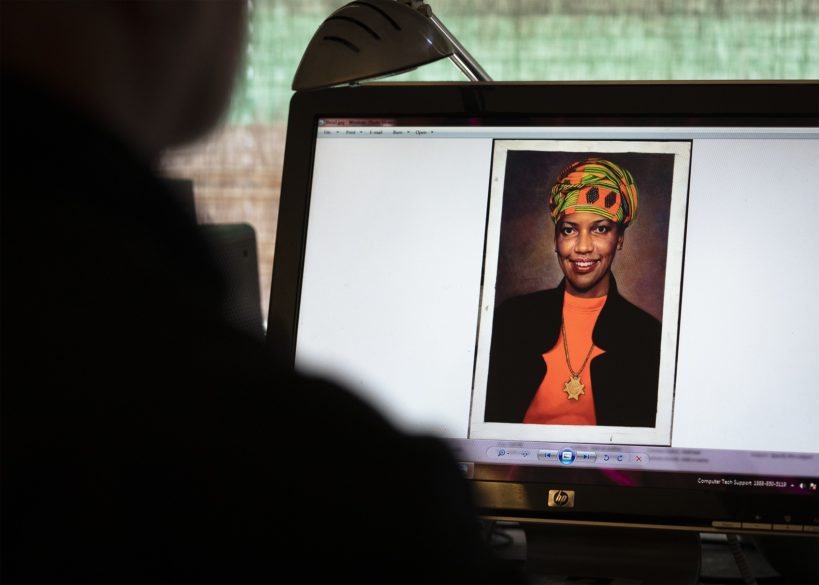
VATICAN
VATICAN CITY (CNS) – Pope Francis recognized a miracle attributed to the intercession of Blessed Artémides Zatti, a Salesian brother who was a pharmacist in Argentina and known for his care for the sick; the miracle clears the way for his canonization. During a meeting April 9 with Cardinal Marcello Semeraro, prefect of the Congregation for Saints’ Causes, the pope also signed decrees advancing the sainthood causes of four other men and five women. Born in the northern Italian city of Reggio Emilia in 1880, Blessed Zatti’s family immigrated to Bahía Blanca, Argentina, in 1897. At the age of 19, he was accepted by the Salesians to study for the priesthood. However, he was forced to abandon his studies after falling ill with tuberculosis. According to his biography published by the Vatican, he moved to the Andean city of Viedma to recover and, during that time, he made a vow to Mary to serve the sick and the poor for the rest of his life if he was healed. After his recovery, he made good on his promise and, after professing his vows as a Salesian brother in 1908, he worked at a Salesian-run hospital where he served for more than 40 years as a trained pharmacist, nurse and operating-room assistant as well as handling the hospitals budget and personnel. Blessed Zatti was diagnosed with liver cancer and died in 1951.
WORLD
NAIROBI, Kenya (CNS) – The Nigerian bishops said lack of arrests in widespread attacks gives credibility to the idea that the government is either complacent or compromised. “Nigerians are sick of flimsy excuses and bogus promises from the government to deal with terrorists,” wrote Archbishop Lucius Iwejuru Ugorji of Owerri, newly elected president of the Nigerian bishops’ conference, on behalf of the bishops. “Considering the billions of naira appropriated for security and the fight against terrorism in recent times, it is difficult to imagine that a large number of terrorists, who unleashed terror on unarmed and law-abiding citizens can disappear in broad daylight without a trace. “It is indeed very hard to believe that our security apparatus lacks intelligence or the ability to fight and defeat terrorists in our nation,” the archbishop said. His April 4 statement came as the country was still dealing with a March 28 attack on a commuter train. Gunmen detonated a bomb on the tracks and opened fire on the train; when Archbishop Ugorji issued his statement, more than 150 people were still missing.
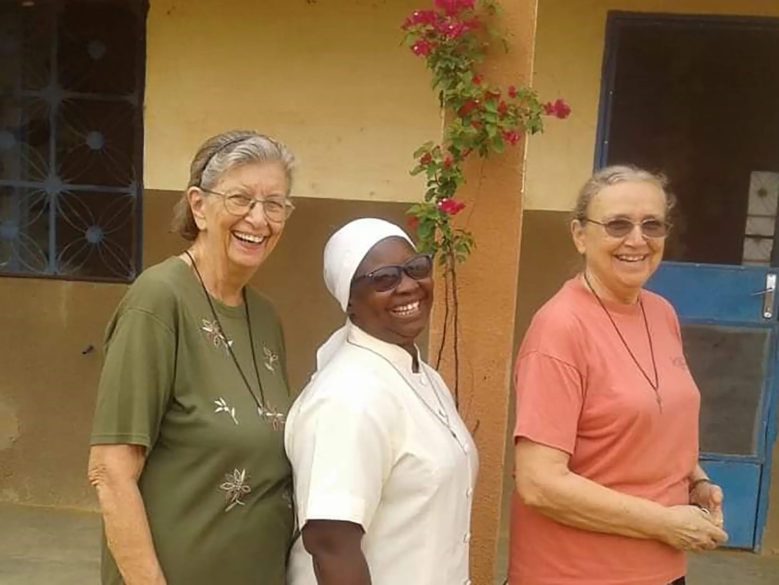
By Judith Sudilovsky
JERUSALEM (CNS) – With pandemic restrictions almost fully lifted, churches and shopkeepers alike are hopeful that the streets of Jerusalem will fill up once again as Easter, Passover and Ramadan converge.
Joseph Hazboun, regional director of the Catholic Near East Welfare Association-Pontifical Mission in Jerusalem, noted that the pandemic has left its mark not only on people in the tourism industry but also on some monasteries and convents that depend on the sales of their homemade products. Though there are signs of returning pilgrims, he said, it is still a long way off from the high numbers of three years ago.
And with the continuing unchecked vandalism attacks on church property, especially but not only in Jerusalem, Christians feel threatened, he said.
In addition to vandalism, in March, Israelis and Palestinians saw an increase in violence. In early March, seven Palestinians were killed in separate clashes with Israeli forces, and in late March three terrorist attacks that killed 11 people left Israelis reeling.
On April 2, the patriarchs and heads of local churches of Jerusalem condemned the violence and called on Christians, Muslims and Jews to show mutual respect for one another at the rare confluence of the three major religious holidays. They called on government authorities to “exercise policies of religious tolerance, restraint of force, and de-escalation of conflict.”
“In these coming weeks that are sacred to our respective religious traditions, we encourage all people of good faith to walk in the pathway of peace that is so central to the symbolism of Jerusalem, the City of Peace. In this way, we can be true witnesses to the world of the common vision of peace/shalom/salaam that is enshrined within the heart of our separate but intertwined religious beliefs,” they said.
This is not the first cycle of violence the Holy Land has experienced, said Sami El-Yousef, chief executive officer of the Latin Patriarchate, and the region has always found a way to rise above it all during religious celebrations.
“If we are faithful to our religion – regardless whether Muslim, Jewish, or Christian – the upcoming season must present a different track to take us all back to the basics and celebrate the majesty of Jerusalem.” He said the season must be “the symbol of unity and peace rather than division and violence.”
Having just returned from Gaza, El-Yousef noted that the Christian community was “very happy” that this year, for the Easter holiday, 720 Israeli travel permits for 80 days were issued. Israel and Egypt have blockaded the Gaza Strip for more than 15 years.
In the northern Israeli city of Haifa, Reem Abunassar, 46, who teaches religious education at St. Joseph Catholic Parish, is still traumatized by the riots last year in Israeli mixed cities at the end of Ramadan, when violence broke out between Israel and Hamas in the Gaza Strip. Her four young adult daughters were attacked by a Jewish mob in front of their house.
During Lent she has been praying for peace, she said.
“To get into the spirit of Easter, I pray each and every day that there will be peace in the world,” she said. “I don’t believe in any violence, in any terrorist attacks, in killing of any kind. This is not in my religion. I believe in peace, and I believe that peace will one day prevail, because I pray a lot for this.”
Sister Bridget Tighe, a member of the Franciscan Missionaries of the Divine Motherhood and general director of Caritas Jerusalem, noted that while this Easter season people are hoping the economy will slowly get back on track, especially with the return of tourism in Bethlehem, West Bank, it will take time, and there is still need for assistance.
In his call for the Good Friday Collection for the Holy Land, Franciscan Father Francesco Patton, custos of the Holy Land, noted how the unprecedented situation of the past two years has affected the Christian communities throughout the Middle East.
“With difficulty we have tried to support materially the weakest communities: the community of Bethlehem and that of Jerusalem, with no more pilgrims and no work; the communities of Lebanon, devastated by an increasingly economic and political crisis; those of Syria, which remains like a prisoner of a war that seems to never end. Also this year on Good Friday, please remember us, your brothers and sisters who live in the Holy Land. Help us according to the generosity of your heart, remembering the words of our Lord Jesus: ‘There is more joy in giving than in receiving'” he said in the statement.
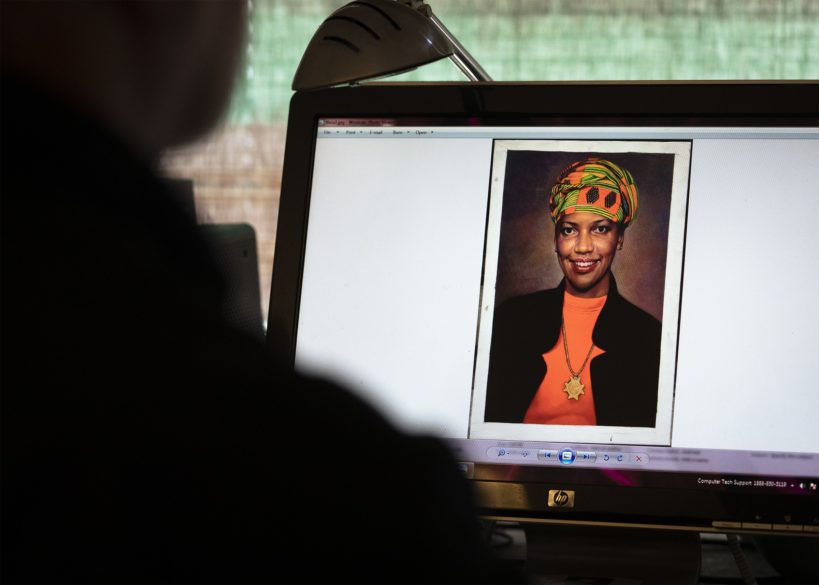
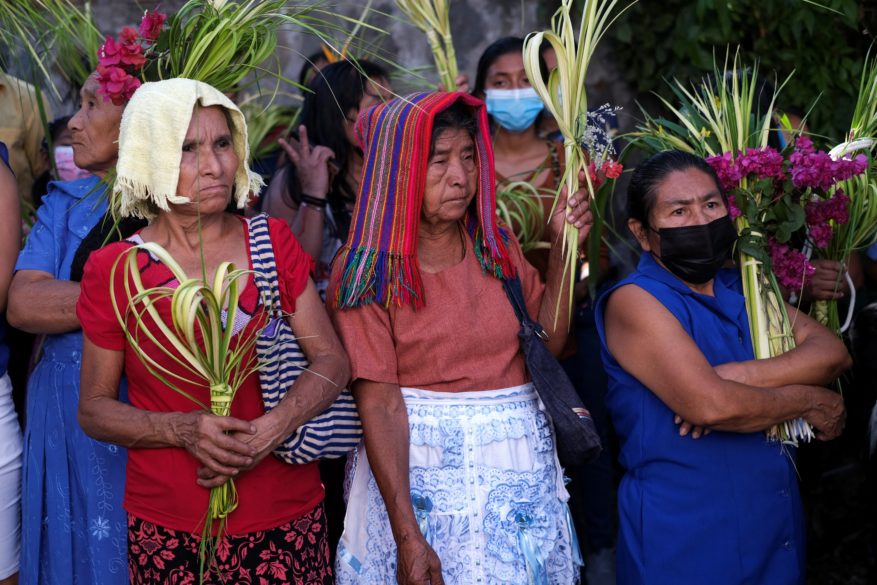
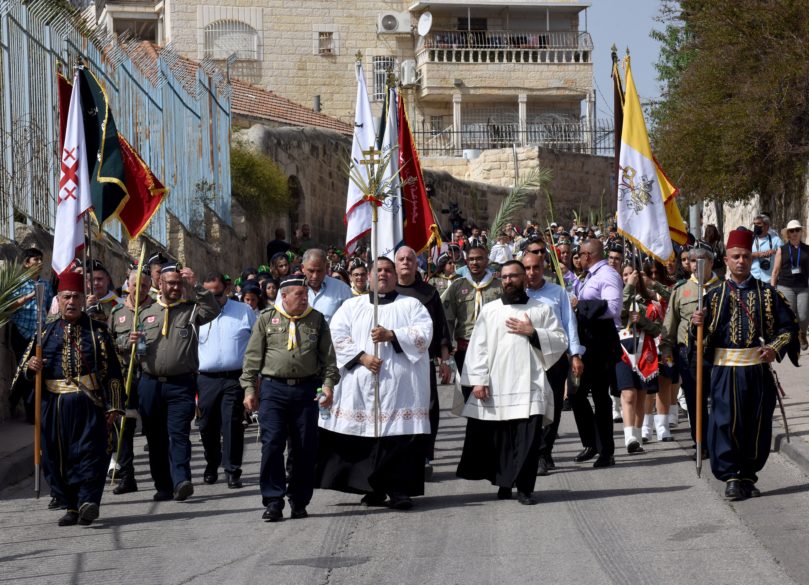
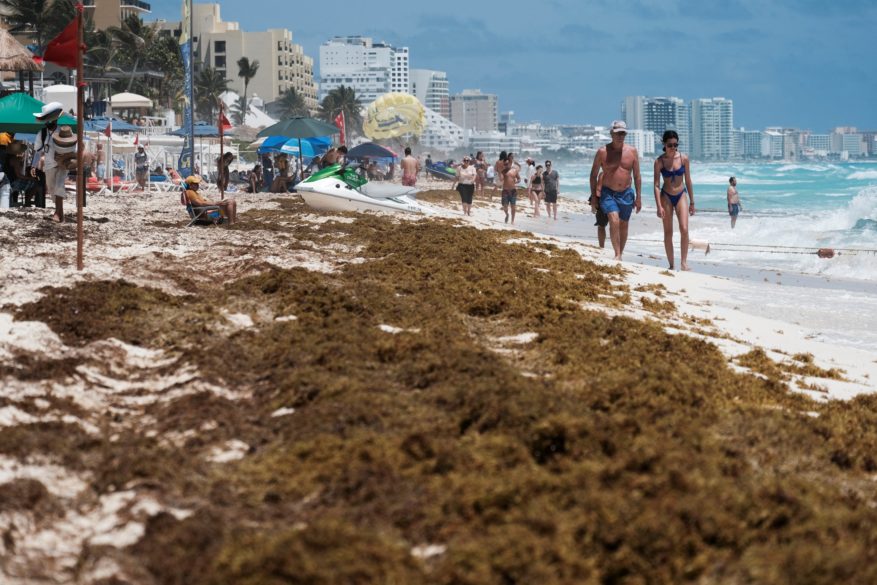
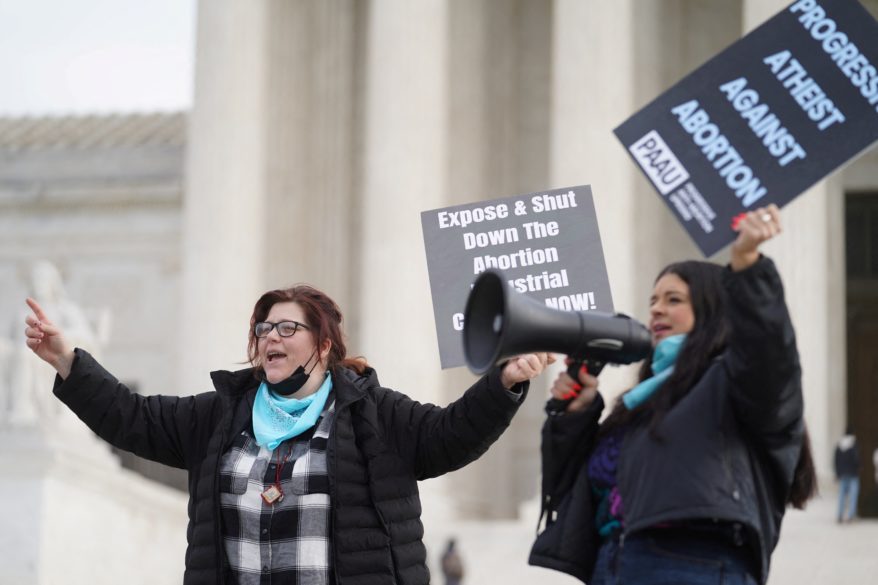
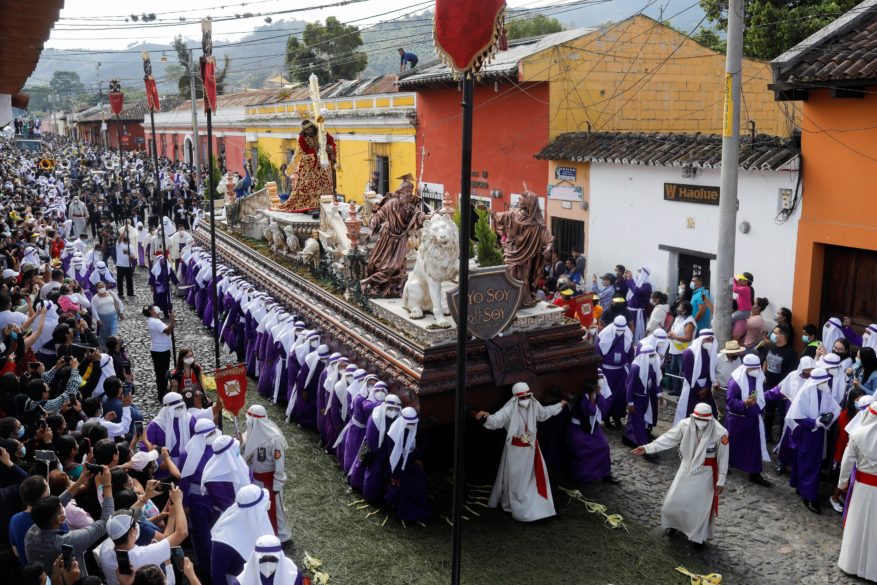
NATION
WASHINGTON (CNS) – The church’s charitable outreach to people fleeing war, political instability, poverty and other threats is a requirement for followers of Jesus, the Administrative Committee of the U.S. Conference of Catholic Bishops said in a March 17 statement. “Some may question why and how the church supports refugees and migrants, regardless of race, creed or color, but the simple truth is that Christ identifies with those in need: ‘For I was hungry and you gave me food, I was thirsty and you gave me drink, a stranger and you welcomed me,’” the committee said, citing Matthew 25:35. Led by Los Angeles Archbishop José H. Gomez as USCCB president, the committee said various challenges have forced people to flee in search of safety and security and that their plight requires a Christian response. “This means that when people are hungry and knock at our door, we feed them. When they come to our door cold, we clothe them. And when someone who is a stranger comes, we welcome him or her. The church does this everywhere she exists,” it said. The statement comes as the efforts of U.S.-based church agencies in ministering to migrants and refugees have faced rising challenges from those who say doing so encourages more people to come to the United States, especially from along the southern border.
VATICAN
VATICAN CITY (CNS) – The Vatican published Pope Francis’ calendar for Holy Week and Easter, which includes the Way of the Cross at Rome’s Colosseum for the first time in two years. The annual commemoration of Christ’s passion at the Colosseum was canceled in 2020 due to restrictions on outdoor gatherings to prevent the spread of COVID-19. And in 2021, there was a pared-down Way of the Cross service in St. Peter’s Square.
As is customary when first publishing the pope’s calendar for Holy Week, the Vatican did not provide the time or place for his celebration of the Mass of the Lord’s Supper on Holy Thursday, April 14. Before the pandemic, Pope Francis had made it a tradition to celebrate the Mass and foot-washing ritual at a prison or detention center, refugee center or rehabilitation facility.
Here is the schedule of papal liturgical ceremonies and events for April released by the Vatican March 21:
– April 2-3, Apostolic visit to Malta.
– April 10, Palm Sunday, Mass in St. Peter’s Square.
– April 14, Holy Thursday, morning chrism Mass in St. Peter’s Basilica.
– April 15, Good Friday, afternoon liturgy of the Lord’s passion in St. Peter’s Basilica.
– April 15, Way of the Cross at night in the Colosseum.
– April 16, Easter vigil Mass in St. Peter’s Basilica.
– April 17, Easter morning Mass in St. Peter’s Square, followed at noon by the pope’s blessing “urbi et orbi” (the city and the world).
– April 24, Divine Mercy Sunday, Mass in St. Peter’s Basilica.
VATICAN CITY (CNS) – The real battles people should be fighting and funding are the ones against hunger, thirst, poverty, disease and slavery, Pope Francis said. Instead, vast sums of money are spent on arms for waging war, which is “a scandal” that just drags civilization backward, he said in an address to a group of Italian volunteers. “What is the point of all of us solemnly committing ourselves together at international level to campaigns against poverty, against hunger, against the degradation of the planet, if we then fall back into the old vice of war, into the old strategy of the power of armaments, which takes everything and everyone backward?” he asked. The pope made his remarks in an audience at the Vatican March 21 with volunteers representing the Italian organization “I Was Thirsty.” Founded in 2012, the group sets up projects that provide clean drinking water to communities in need around the world.
WORLD
WARSAW, Poland (CNS) – A Ukrainian priest described escaping from his bombed-out parish in Mariupol and said he still hopes some Catholics will survive the relentless Russian onslaught. Pauline Father Pavlo Tomaszewski said the decision to leave was not easy, “but when they started shelling the whole city, we realized we’d have to go.” “They bombed and shelled us without any break for four days – since our monastery had no cellar for hiding in, we could see tall apartments blocks exploding in front of us,” said the priest, who comes from the western city of Kamenets-Podolsky but studied in neighboring Poland. “Although there’d been water, food and gas and electricity supplies at the beginning, these were deliberately hit to cut off what people needed for daily survival. By the end, with no sense of time, we’d lost any contact with parishioners or with the outside world.” The priest spoke at a March 18 virtual news meeting organized by the pontifical agency Aid to the Church in Need, as Russia’s Defense Ministry confirmed its forces were “tightening the noose” around Mariupol, a port city on the Sea of Azov. Up to 90% of all buildings in the city were reported damaged. Father Tomaszewski said Russian forces had targeted civilians from the outset, bombing and shelling Mariupol’s eastern districts, but had intensified “atrocities against the innocent population” in retaliation for Ukrainian resistance.
Por Lucien Chauvin
SANTIAGO DE CHUCO, Perú (CNS) — El padre Carlos Campos sabía que enfrentaría múltiples desafíos cuando fue designado para administrar la iglesia principal en Santiago de Chuco — una ciudad situada en las montañas del norte de Perú — pero nunca esperó recibir amenazas físicas.
Dicho departamento alberga algunos de los distritos más pobres de Perú, y grandes zonas suelen quedar aisladas durante la temporada de lluvias, los primeros tres meses del año. La pobreza y el aislamiento empeoraron cuando la pandemia golpeó solo unos meses después de la llegada del padre Campos, y el gobierno de Perú implementó una cuarentena drástica de tres meses.
El padre Campos y un grupo de jóvenes feligreses formaron un grupo Laudato Si’ y comenzaron un trabajo de extensión que incluyó asistencia técnica para agricultores, distribución de alimentos y, más recientemente, la construcción de un comedor de beneficencia que brindará alrededor de 150 comidas diarias, principalmente a los residentes mayores. El padre Campos también supervisa una pequeña escuela parroquial.

La labor social fue bien recibida, pero el padre Campos no encontró la misma reacción cuando comenzó a cuestionar el impacto de la minería salvaje en la provincia. En lugar de apoyo, él comenzó a recibir amenazas.
“La minería salvaje no solo afecta el medio ambiente, sino a toda la sociedad. Recibimos amenazas cuando empezamos a oponernos a lo que estaban haciendo. Desafiarlos es básicamente como David enfrentando a Goliat”, expresó el padre Campos.
Santiago de Chuco y las provincias aledañas son ricas en oro y otros metales, y la minería existe desde la época precolombina. Si bien hay minas formales de clase mundial en la zona, grandes áreas de la provincia han sido invadidas por mineros salvajes, que excavan en las colinas en busca de minerales; ellos no usan equipo de protección y no cumplen con las normas ambientales.
El padre Campos reveló que el problema se intensificó durante la pandemia, cuando otras fuentes de trabajo se evaporaron y la gente recurrió a la minería.
“El poco control que había sobre la minería salvaje desapareció con la pandemia. Se ha convertido en una batalla campal donde quiera que vayas. Están contaminando el aire, el suelo, y el agua”, acotó.
El gobierno de Perú y las agencias internacionales han centrado la atención en la minería salvaje en la Amazonía, especialmente en el departamento de Madre de Dios, en el sureste de Perú, donde el papa Francisco llamó a la minería ilegal de oro un “falso dios” durante una visita a Perú en 2018. Varios distritos de Madre de Dios están en estado de emergencia desde febrero de 2019; sin embargo, la destrucción y la violencia continúan.
Hombres armados desconocidos dispararon y mataron a un activista ambiental el 20 de marzo en La Pampa, una de las zonas mineras salvajes más notorias. El Vicariato Apostólico de Puerto Maldonado condenó el asesinato de Juan Fernández, exigiendo una investigación y preguntando de qué sirve la emergencia si el Estado no puede proteger a sus ciudadanos. El hermano de Fernández es líder de una comunidad cristiana en Madre de Dios.
“Nos solidarizamos con quienes, en esta región de Madre de Dios, día tras día, se
sienten abandonados por un Estado que parece no velar por ellos. ¡Están siendo amenazados y
asesinados!”, dijo el vicariato.
La minería salvaje en el altiplano ha recibido mucha menos atención.
El epicentro en esta parte del Perú es Quiruvilca, un pueblo de 4,150 pies sobre el nivel del mar en Santiago de Chuco. Su nombre significa “diente de plata” en quechua, la lengua indígena más prevalente de Perú.
La gran mina polimetálica de Quiruvilca cerró abruptamente en diciembre de 2017, dejando a miles de mineros sin empleo de la noche a la mañana. La mayoría inmediatamente decidió minar por su cuenta y muchos otros se mudaron con la pandemia. El alcalde Oscar Diestra dijo que no sabe cuántas personas están trabajando en los cerros, pero en el último conteo había más de 100 actividades económicas diferentes — desde cavar la tierra hasta operar puestos de comida — relacionadas con la minería en el pueblo.
“Aquí todo gira en torno a la minería, aunque ya no tengamos una empresa minera”, indicó.